
Tate Williams pours ice into a 10-gallon Igloo at the Ben’s Bells water station in downtown Tucson on Tuesday, July 29, 2025. The water station is part of the Agua Para El Pueblo project, which provides free drinking water to Tucsonans across the city. (Stephanie Casanova / CALÓ News)
Tucson, Arizona – Tate Williams sprays vinegar water on the spout of an orange 10-gallon Igloo jug, the sun burning down on him on a 106-degree afternoon in Tucson.
He drains what little water is left, sprays and wipes the inside of the jug, and pours three bags of ice into it. Then, he carries a seven-gallon water jug out from his car to the water station and fills the Igloo to the top with water, zip ties the white lid onto the Igloo and puts a lock on it.
It’s a routine he goes through almost daily during the hottest months of the year, as he makes sure the water station outside of Ben’s Bells in downtown Tucson has fresh water for the unhoused community and for anyone walking past who might need to rehydrate. It’s one of almost 30 stations throughout the city set up at churches, private businesses and even some homes through the Agua Para El Pueblo project.
Agua Para El Pueblo was created by a group of mutual aid organizers who saw a need for more access to clean, cold drinking water in Tucson, especially in summer months when temperatures consistently reach more than 100 degrees.
When Elizabeth Casey, with Community Cares Tucson, was walking around an annual festival, she saw a water refill station and wondered why there weren’t permanent ones in the city. She brought the conversation to Williams and Xavier Martinez from Amphi Liberation Mutual Aid.
Inspired by those who set up water stations for migrants in the desert and by the work of Gator-Aid, a mutual aid group that fills a wagon with water bottles and other essential items and passes them out to people around Tucson, they decided to establish water stations in areas with high traffic of pedestrians and unhoused community members.
In Phoenix, groups had tried setting up water stations in public parks, only to find that police had destroyed or removed them, Williams said. Choosing a different tactic, they reached out to local business owners who already supported their mutual aid efforts. The first water station was installed downtown, located across from a plasma donation center at Arizona Poppy Shop.
More support than they expected
When they started the project, Williams expected to set up maybe five stations around downtown and central Tucson, he said. He’s pleased to see how much support the program has gotten, with stations available far beyond the central Tucson area. And the group is still looking for more hosts.
At some point last summer, people started leaving reusable water bottles at stations, Williams said, along with clothes, sunscreen and other items. Now, the group frequently asks for reusable water bottle donations through social media.
Before the project had a name, Williams, Martinez and Casey were doing the work alone. They accepted donations and asked business owners to host stations. Then Angelantionio Breault, with Reconciliation on the River, an organization that focuses on environmental justice, education and community action, reached out with an offer to partner with them.
Agua Para El Pueblo was born.
For Breault, the water station project is an immediate way to address larger environmental issues. When he cleaned the Santa Cruz River, he would pick up several Polar Pop corner store cups. Water stations with trash bins, paper cups and often reusable water bottles help reduce the amount of trash that eventually makes its way into natural bodies of water.
Because the concept is simple and doesn’t involve as much commitment, it invites residents to take a small part in caring for their community, Breault said.
The stations, which cost between $175 and $200, are paid for through a Just Communities Arizona grant and through individual donations.
Just Communities Arizona is an abolitionist nonprofit organization that supports community care programs and works to end the current system of criminalization and mass incarceration. According to executive director Caroline Isaacs, Agua Para El Pueblo became a partner at the beginning of the summer through its Community Safety Incubator Projects.
Enrique Alan Olivares-Pelayo, Safety Incubator project manager with Just Communities Arizona, said seeing community organizers take it upon themselves to increase people’s safety by providing them with drinking water encouraged the organization to support the work.
“It is a literal life and death safety proposition to run out of water in Tucson,” Olivares-Pelayo said. “It is deadly to dehydrate in Tucson, and for people who are unhoused or underresourced, getting access to water increases their safety and keeps them alive, regardless of anything else that they might have going on, regardless of if they can pay for access to a bottle of water. And so any water distribution is community safety work in the summer in Tucson.”

Tate Williams pours ice into a 10-gallon Igloo at the Ben’s Bells water station in downtown Tucson on Tuesday, July 29, 2025. The water station is part of the Agua Para El Pueblo project, which provides free drinking water to Tucsonans across the city. (Stephanie Casanova / CALÓ News)
Water stations inspire from Tucson to El Paso
Joy Soler, owner of Revolutionary Grounds Books and Coffee, was immediately on board when one of her employees showed her a social media post about the stations. Soler has always offered water to anyone who came into the cafe. Now, she also keeps an Agua Para El Pueblo water station outside the cafe on the sidewalk. Next to the water station, she keeps a bowl for dogs, birds and other critters passing by the shop.
“Water is life,” Soler said. “It's basic and essential to everybody and to everything.”
She described experiencing heat exhaustion and heat stroke, saying she was so dehydrated her legs hurt. Aware of her privilege, her ability to stay inside when it’s hot out, she said she can only imagine what people who don’t have a stable home go through in the summer heat.
“That's just living in the desert. You need a lot of water. It's hot,” Soler said. “And then if you don't have a stable place to live indoors or continuous access to clean water, then you're just constantly dehydrated, and that takes its toll on the body, and it's not human to make people suffer through that.”
The project recently inspired a group in El Paso, Texas to set up their own water station. Sun City Pickers, who clean up litter in their communities, used the project’s how-to guide and, about a week ago, they tagged Agua Para El Pueblo on Instagram, showing them the water station outside a St. Vincent De Paul thrift store.
“It was the dream,” Williams said. “Like, I know it sounds corny but, I think the whole point of the project is that it's not something that we can do on our own,” and the project relies on support from the community.
Not all conversations lead to a station, however, Martinez said and shared about discussing the idea with business owners in the Amphi neighborhood, worried their neighbors might not agree and retaliate.
But Martinez has seen the need for them. When Williams was setting up the station at Fourth Avenue Coalition, a nonprofit community space, Martinez recalled walking by with a group of kids from a summer camp he was working at. He told them about the station and they shared their desire to see something like that in their neighborhoods.
“Whether it's the water fountains at the parks that are 102 degrees when it comes up the fountain … there's not reliable water,” Martinez said. “And so when you see stuff like that, even when you're a kid, you're like, why don't we have that?”
On Monday afternoon, as Williams sat in the Fourth Avenue Coalition space and talked about the need for water in Tucson, a man walked up to the water station, refilled his reusable water bottle and chugged some of it. He topped it off and continued on his way, a look of relief on his face.
Stephanie Casanova is an independent journalist from Tucson, Arizona, covering community stories for 10 years. She is passionate about narrative, in-depth storytelling that is inclusive and reflects the diversity of the communities she covers. She recently covered the criminal justice beat at Signal Cleveland, where she shed light on injustices and inequities in the criminal legal system and centered the experiences of justice-involved individuals, both victims and people who go through the system and their impacted loved ones.

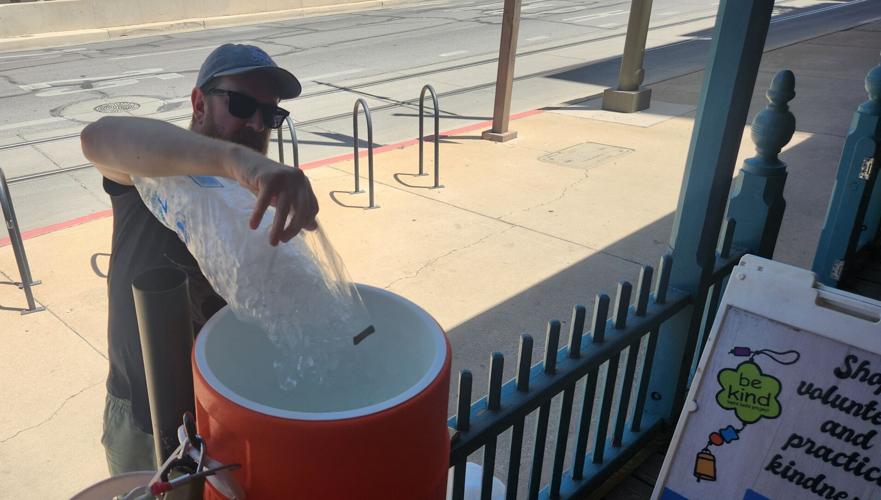
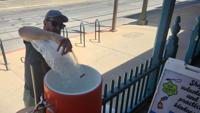

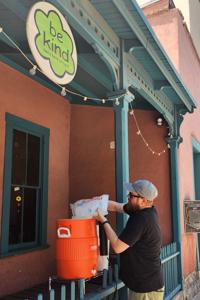

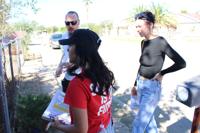









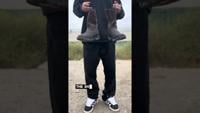
(0) comments
Welcome to the discussion.
Log In
Keep it Clean. Please avoid obscene, vulgar, lewd, racist or sexually-oriented language.
PLEASE TURN OFF YOUR CAPS LOCK.
Don't Threaten. Threats of harming another person will not be tolerated.
Be Truthful. Don't knowingly lie about anyone or anything.
Be Nice. No racism, sexism or any sort of -ism that is degrading to another person.
Be Proactive. Use the 'Report' link on each comment to let us know of abusive posts.
Share with Us. We'd love to hear eyewitness accounts, the history behind an article.